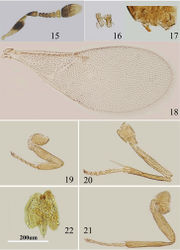Metaphycus dispar
| Notice: | This page is derived from the original publication listed below, whose author(s) should always be credited. Further contributors may edit and improve the content of this page and, consequently, need to be credited as well (see page history). Any assessment of factual correctness requires a careful review of the original article as well as of subsequent contributions.
If you are uncertain whether your planned contribution is correct or not, we suggest that you use the associated discussion page instead of editing the page directly. This page should be cited as follows (rationale):
Citation formats to copy and paste
BibTeX: @article{Wang2013ZooKeys285, RIS/ Endnote: TY - JOUR Wikipedia/ Citizendium: <ref name="Wang2013ZooKeys285">{{Citation See also the citation download page at the journal. |
Ordo: Hymenoptera
Familia: Encyrtidae
Genus: Metaphycus
Name
Metaphycus dispar (Mercet, 1925) – Wikispecies link – Pensoft Profile
- Euaphycus dispar Mercet, 1925: 25–27. Lectotype + (designated by Noyes 1981[1]: 174), Spain, IEE.
- Metaphycus tamakatakaigara Tachikawa, 1957: 27–30. Holotype female, Japan, KYUN. Synonymized with dispar by Trjapitzin 1989[2]: 232.
- Metaphycus dispar (Mercet); Sugonjaev and Babaev 1971[3]: 70–75. Trjapitzin 1978[4]: 314; Trjapitzin 1989[2]: 384; Guerrieri and Noyes 2000[5]: 168.
Female
Body length, including ovipositor, about 0.67mm. Frontovertex orange; orange in ocellar area, pale yellow between occipital margin and posterior ocelli; immaculate from occiput to base of mandible; mouth margin pale yellow below torulus; rest of head, except occiput, white; antenna (Fig. 15) with radicle yellow; scape mostly pale yellow and with a dark brown mark in middle, dorsal margin in middle brown; pedicel in proximal two thirds dark brown and distal one third white, dark brown area extending slightly towards apex externally and internally; F1–F3 dark brown, F4 pale brown, F5–F6 yellow-white, clava dark brown, becoming slightly paler towards apex, apex yellow; occiput with a large dark brown area above foramen, rest white; neck of pronotum black, posterior margin white, lateral spots relatively large and distinct, rest white; dorsum of thorax orange; sides and posterior margin of mesoscutum and axillae inconspicuously bordered brown; setae translucent pale orange, silvery in most lights; tegula white with apex pale brown; metanotum brown; mesopleuron white; prosternum and mesosternum white; legs (Figs 19–21) pale yellow; fore wing (Fig. 18) hyaline and with linea calva interrupted, venation yellow-brown; hind wing hyaline; propodeum medially pale brown, brown laterally, sides white; gaster dorsally mainly very pale brown, but basal tergite dark brown, sides and venter white; ovipositor sheath yellow.
Head with polygonally reticulate sculpture and mesh size slightly less than that of one eye facet; ocelli forming an acute angle less than 35°; eye not quite reaching occipital margin, separated by much less than diameter of a facet; eye margins subparallel with frontovertex slightly wider anteriorly; scrobes shallow and U-shaped; antenna (Fig. 15) with scape about 3.1–3.3? as long as broad; funicle with F1–F4 smallest, subequal and transverse, F5 a little larger and F6 largest, linear sensilla only on F5 and F6; clava 3-segmented, its apex more or less rounded but with a short slightly oblique truncation; mandible relatively broad with three subequal, apical teeth (Fig. 17); palpal formula 2-2 (Fig. 16), notaular lines virtually absent; fore wing venation and setation as in Fig. 18; ovipositor (Fig. 22) slightly exserted, about 4.3? as long as ovipositor sheath.
Relative measurements: HW 9, FV 3,FVL 4, POL 2 AOL 3, OOL 0.5, OCL 1, POD 1, AOD 1, EL 6, EW 4, MS 3, SL 4.5, SW 1.5, FWL 28, FWW 11, HWL 15, HWW 4, OL 7, GL 1.6, MT 8.
Male
Length 0.7–0.8 mm. Very similar to female except for antenna, genitalia and darker coloration; torulus with several pores inside the lower margin. (Guerrieri and Noyes 2000[5]).
Hosts
Ericerus pela, Eulecanium sp., Eulecanium douglasi, Eulecanium kunoense, Eulecanium rugulosum, Eulecanium secretum, Eulecanium tiliae, Parthenolecanium corni, Parthenolecanium persicae, Pulvinaria sp., Pulvinaria vitis, Rhodococcus turanicus.
Distribution
China (Beijing, Xinjiang), Japan, Kazakhstan, Kirgizia, Kyrgyzstan, Mongolia, Tajikistan, Turkmenistan, Uzbekistan, Armenia, Canary Islands, Czech Republic, Finland, France, Greece, Hungary, Italy, Madeira, Russia, Russia-Adygeyskaya, Russia-Altayskiy Kray, Russia-Buryatskaya Respublika, Russia-Sakhalin Oblast, Slovakia, Spain, United Kingdom, United Kingdom-England, former Yugoslavia, Georgia, USA, (Trjapitzin 1989[2]; Guerrieri and Noyes 2000[5]).
Material examined
China: 1+, Xinjiang, Kurle, 1965.VI.9, Coll. D. X. Liao (IZCAS); 1+, Beijing, Changping, 2011.IX.23 (IZCAS); 1+, Jiangsu, Nianjing, 2011.VI. (IZCAS); 1+, Liaoning, Shenyang, 1991.VI., Coll. J. X. Lou (IZCAS). France: 1+, Corsica Propriano, 1989.VIII, Coll. J. S. Noyes (BMNH); Greece: 1+, Corfu Ano Kourakiana, 1987.VIII.30, Coll. J. S. Noyes (BMNH); Japan: 1+, Tokyo, 1981.VIII.2, Coll. Ikece & Carlson (BMNH).
Diagnosis
Scape mostly pale yellow and with a dark brown mark in middle, dorsal margin in middle brown, and about 3.1–3.3? as long as broad; ovipositor slightly exserted, about 4.3? as long as ovipositor sheath.See diagnosis under the Metaphycus alberti. According to Guerrieri and Noyes (2000)[5], Metaphycus dispar is very close to Metaphycus kozari Sugonjaev (1975)[6].
Taxon Treatment
- Wang, Y; Li, C; Zhang, Y; 2013: A taxonomic study of Chinese species of the alberti group of Metaphycus (Hymenoptera, Encyrtidae) ZooKeys, 285: 53-88. doi
Other References
- ↑ Noyes J (1981) On the types of the species of Encyrtidae described by R. Garcia Mercet (Hymenoptera: Chalcidoidea). Eos. Revista Espanola di Entomologia. Madrid 55/56: 165–189.
- ↑ 2.0 2.1 2.2 Trjapitzin V (1989) Parasitic Hymenoptera of the Fam. Encyrtidae of Palaearctics. Opredeliteli po Faune SSSR Zoologicheskii Instituta Akademii Nauk SSR, Leningrad 158: 1-489.
- ↑ Sugonjaev E, Babaev T (1971) Morphological and biological peculiarities of Metaphycus dispar Mercet (Chalcidoidea, Encyrtidae) – a parasite of Coccidae. Izvestiya Akademii Nauk Tadzhikskoy SSR (Otdelenie Biologicheskikh Nauk) 1: 70-75.
- ↑ Trjapitzin V (1978) Hymenoptera II. Chalcidoidea 7. Encyrtidae. Opredeliteli Nasekomykh Evropeyskoy Chasti SSR 3: 236-328.
- ↑ 5.0 5.1 5.2 5.3 Guerrieri E, Noyes J (2000) Revision of European species of genus Metaphycus Mercet (Hymenoptera: Chalcidoidea: Encyrtidae), parasitoids of scale insects. Systematic Entomology 25: 147-222. doi: 10.1046/j.1365-3113.2000.00099.x
- ↑ Sugonjaev E (1975) New Palaearctic species of the genus Metaphycus (Hymenoptera, Chalcidoidea). Zoologicheskiy Zhurnal 55 (1): 145-148.
Images
|
